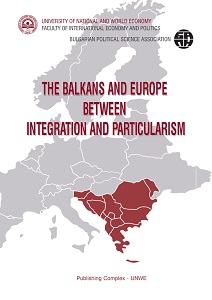The Western Balkans in the EU Accession Process: PES(I) Assessment
The Western Balkans in the EU Accession Process: PES(I) Assessment
Author(s): Galya Mancheva, Elena Simeonova
Subject(s): Politics / Political Sciences, Politics, Economy, National Economy, Political Theory, Political Sciences, Political economy, Methodology and research technology, Financial Markets, Fiscal Politics / Budgeting, Socio-Economic Research
Published by: Университет за национално и световно стопанство (УНСС)
Keywords: Western Balkans; political regime; democracy score; exchange rate regime; GDP; GDP per capita; population growth; age and educational structure; key interest rate; sovereign spreads; sovereign credit
Summary/Abstract: Despite the internal destabilization and ongoing asymmetric crises, European Unionstill tends on extending its borders. The main target destinations are Western Balkans countries,which, undoubtedly, present a more complex case compared to previous rounds of the EU enlargement. In the same time, as a result of acceleration, EU has set standards higher than ever. Inthe strive to cover the EU-set acquisition standards, and to attract foreign investments, WesternBalkans countries produce different degrees of political risk which affects the business and investors. The article presents a part of the results of a complex authors’ research with а main focus of evaluating the Western Balkans countries political, economical, social, and risk environment inthe Eurointegration processes in the region. A specially designed modification of the well-knownPEST analysis (PES(I)) analysis is applied on 10-year period (2007-2017). It is concluded thatWestern Balkan accession to EU is more a political rather than an economical issue. Based on theanalysis, Republic of Albania is shown to be the best performing country among the region, doingthe biggest progress in economic and political aspects, generating the lowest political risk levels.Keywords: Western Balkans, political regime, democracy score, exchange rate regime, GDP,GDP per capita, population growth, age and educational structure, key interest rate, sovereignspreads, sovereign credit risk, credit rating, financial markets, political indicators, political risk.
Book: The Balkans and Europe between Integration and Particularism
- Page Range: 256-275
- Page Count: 20
- Publication Year: 2019
- Language: English
- Content File-PDF

